腰痛専用マットレスでおなじみの高反発マットレス【雲のやすらぎ】がバージョンアップして、【雲のやすらぎプレミアム】になりました。 腰痛対策以外にも魅力がいっぱい詰まっているんです♪
冷え性の私は布団に入ってからも足が冷たくて眠れずに朝から元気が出ずにボーっとしてしまうこともしばしば…
 ですが、冬のある日、雲のやすらぎプレミアムのマットレスに変えた時から秋冬のロレーヌダウン素材の面を表にして寝ると
ですが、冬のある日、雲のやすらぎプレミアムのマットレスに変えた時から秋冬のロレーヌダウン素材の面を表にして寝ると
本当に温かくぐっすりと眠ることができました。
そんな高反発マットレス【雲のやすらぎ】ですが、【かさばる・へたりやすい・重い・カビやすい・高価など…】良くない口コミをインターネットではよく見かけます。
私が実際に雲のやすらぎプレミアム使って感じたことを悪い口コミの実証も含め大公開します!
目次
雲のやすらぎプレミアムのマットレスを実際に購入してみた結果…
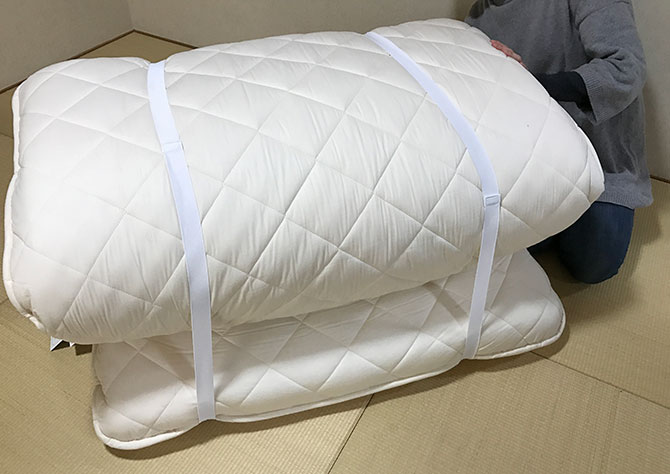
私が雲のやすらぎプレミアムを選んだ理由は、極度の冷え性だからです。
いつも足や指先が冷たくてお風呂に入った後、 時間が経ってしまってからお布団に入るとなかなか温まりませんでした。
それなのに、床にぺらぺらのせんべい布団を敷いて眠っていました。
そのため、冬は底冷えして寝つくのに時間がかかり、 朝はスッキリ起きれずに、夜眠るのがストレスにまでなっていました。
そこで、ふかふかの布団で眠りたい、暖かい布団で眠りたい、とインターネットで口コミを参考に検索した結果、 出会ったのが【雲のやすらぎプレミアム】でした。
雲のやすらぎプレミアムが届いたその日のことは忘れられません。
雲のやすらぎプレミアムを使ってデメリットを感じた方たちの口コミの実証まとめ
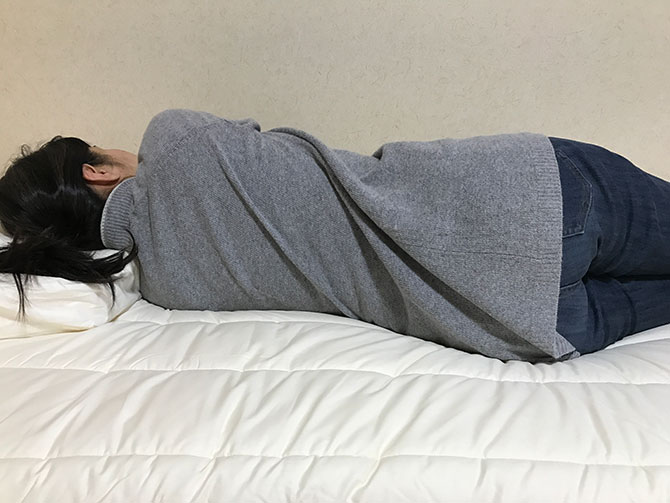
インターネットでよく見かける雲のやすらぎの良くない点として口コミでよくあげられている 【重い、かさばる、へたりが早い】等…ですが、私なりに実証してみました!
雲のやすらぎプレミアムは重い?!
雲のやすらぎで一番多いデメリットの口コミは【重い】じゃないでしょうか?
私も布団を床に敷いて眠るので、毎日布団の上げ下げをするのですが雲のやすらぎは7kgほどあり、 確かに重いです。
ただ、毎日布団の上げ下げをしている私にとっては、今まで寝ていた布団の重さと比べてもそこまで段違いに重いとは思いませんでした。
雲のやすらぎプレミアムはかさばる?!
雲のやすらぎのデメリットで次に多いのは【かさばる】なのですが、これは畳むと確かにかさばります。
私は干すのを兼ねて朝起きてから雲のやすらぎを寝室の壁に立てかけています。 寝るだけの部屋なので、邪魔にもなっていません♪
もし気になるようでしたら、しっかり場所を確保してからの購入をおすすめします!(笑)
雲のやすらぎプレミアムはすぐにへたる?!
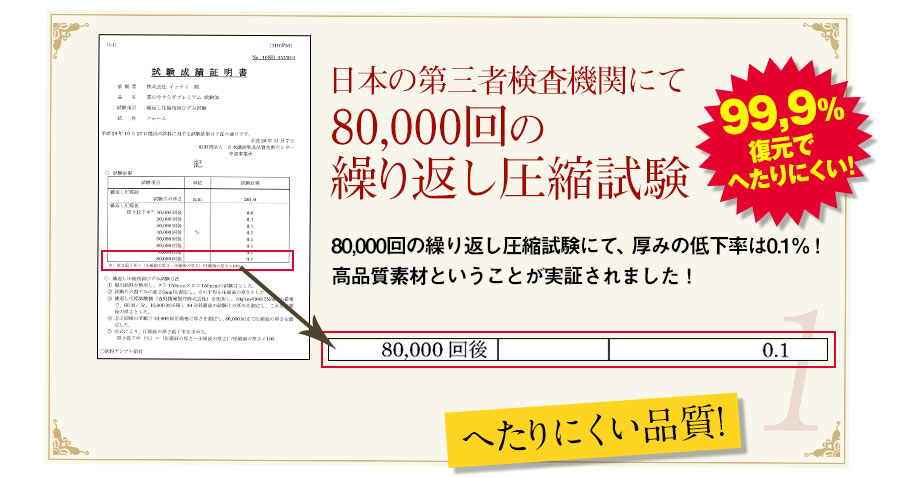
雲のやすらぎは厚さ17cmの極厚ボリュームがポイントなのですが、よく【買ってすぐにへたった】 という口コミも拝見します。
ですが、雲のやすらぎプレミアムは日本の第三者検査機関で80,000回の繰り返し圧縮試験を行ったところ、なんと元の厚みからへたりはわずか【0.1%】!!!
また、圧縮試験に至っては100%回復したようです。
さらにウレタンの密度も高く、へたりにくいことがわかります。
数字で証明されているから、へたりも心配せずに雲のやすらぎを使うことができますね。
それでも不安な方は、ぜひ7月末までの100日返金保証キャンペーンをご利用ください♪
雲のやすらぎから雲のやすらぎプレミアムへバージョンアップ
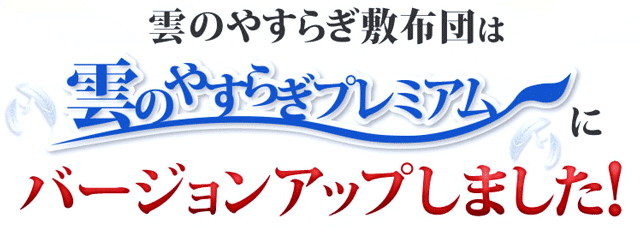
雲のやすらぎプレミアムが今までの寝具と違うところは17cmという極厚のボリュームです。
凹凸アルファマットで高反発スプリングマットを挟んだサンドイッチ構造になっているので理想の寝姿勢を保ったままで朝までぐっすり眠れて、腰痛や関節痛などを防ぐためにも役立つことが、腰の専門家である「3名の整形外科医」に認められました。
両側にはフランスロレーヌ羊毛とマイティトップⅡという2種類の素材を採用していて、季節に合わせて使う面を変えることで一年中使用できます。
暑い季節には通気性がよく、寒い季節は保温性に優れているのでオールシーズン快眠効果が得られてスポーツ選手や医療関係者にも支持されています。
雲のやすらぎプレミアムなら自宅で高級ホテルのベッドのような快適な寝心地を実現できます。
高反発スプリングで極上の寝心地に導きます

バージョンアップした雲のやすらぎプレミアムはサイドスプレッドマットから
高反発スプリングマットへ変わりました。これは寝心地に大きな影響を与え、寝心地の違いは一目瞭然です。
朝までずっと快適に寝られることはもちろんのこと、腰痛が改善できる期待もぐっと上がったのです。
どんな寝具を使っても腰痛が治らないのであれば、 バージョンアップした雲のやすらぎプレミアムを使用してみると睡眠の質が上がったことを実感できます。
雲のやすらぎプレミアムのマットレスを使えば疲労回復

疲労回復をするのには、いくつか方法がありますがその中の一つに睡眠をとることがありますが、
良質な睡眠をとるには良質な寝具が必要です。
また、人生の三分の一は布団やベッドの上で過ごすといわれているので、寝具にはこだわりを持って選んでいただきたいです。
雲のやすらぎプレミアムは、腰や首などに負担をかけずに眠れる設計の敷布団で、体の痛みなど悩みがある方には特におすすめ!
毎日家事や仕事に忙しいあなたにこそ使ってほしい高反発マットレスは【雲のやすらぎプレミアム】です。
雲のやすらぎプレミアムのマットレスは体圧分散の厚みが3cm増量

雲のやすらぎプレミアムは5層構造が雲のやすらぎと比べてどのように変化したのでしょうか。
凹凸アルファマットが3cm厚くなったことで、高反発スプリングマットのメリットを最大限に引き出しています。
もちろん、サイドスプレッドマットのときも雲のやすらぎは人気が高かったのですが、 さらなる効果が期待できます。
商品特性を解説したとしても、実際に使ってみないことにはこの感動は伝わらないと思います。 腰や首の痛みが取れない人であれば、新しくなったマットレスを試してみましょう。 きっと、これまでにない睡眠をとることができます。
雲のやすらぎプレミアムのおすすめポイント
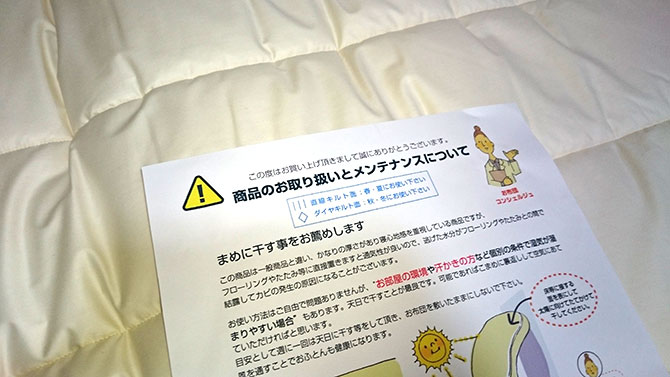
上でもお伝えしましたが、私は冷え性で、冬はお風呂に入ってから時間が経って お布団に入るとなかなかお布団が温まらずに寒くてなかなか寝付けないことがしばしばあったのですが、 床の上に雲のやすらぎプレミアムひいて眠っても底冷えせず、すぐに温まり安心です。
また、冬になると寒さによる冷えのせいで夜中にお手洗いにしばしば起きていたのですが、 雲のやすらぎプレミアムを使いだしてからそれもなくなりました。
夜中に起きていたせいで熟睡感がなく、朝はスッキリ目覚めることができなかったので これは本当にうれしかったです。
更に、リバーシブル構造でひっくり返すだけで一年中使えるというところも楽ちんで めんどくさがりな私にはぴったりでした♪ ついでにデスクワークで少し腰痛もありましたが、きれいさっぱりなくなってしまいました。
ぜひこのサイトを読んでくださっている皆様に伝えたい、 雲のやすらぎプレミアムのおすすめポイントを今一度、お伝えします♪
雲の上でねているようなふわふわ感

雲のやすらぎプレミアムは名前の通りふわふわの寝心地で、 本当に雲の上にいるような気持ちになれる画期的な布団です。
弾力の秘密はこだわりの5層構造にあり、17cmというボリューム感で まるでホテルのベッドのような厚さを自宅で体験できます。
中身は凹凸のアルファマットと高反発のスプリングマットがサンドイッチ構造になっていて、 フランス製の羊毛やダニ防止機能が付いた通気性のよいマットを側面に使っているのも魅力的です。
季節を問わずに使用できるのでこれ1枚で一年中快眠を約束してくれます。
雲のやすらぎプレミアムは体にやさしくフィットするので寝ている間に姿勢を崩さず、 背中や腰を守って包み込んでくれる健康的な布団です。
一年中快適に使えるリバーシブル
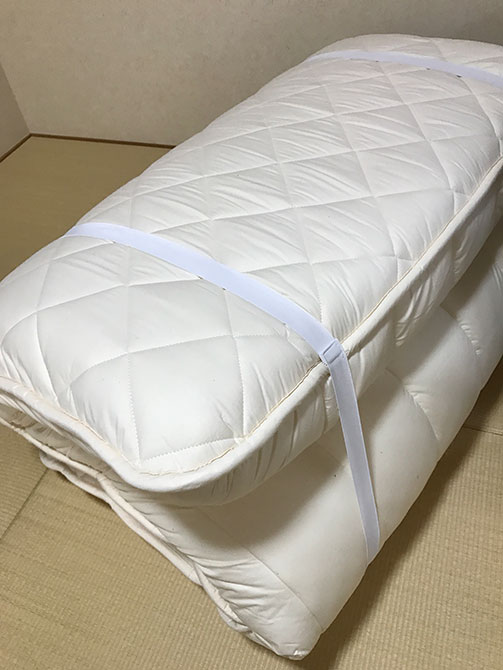
雲の上で寝ているような気持ちになれる快眠布団の雲のやすらぎプレミアムは、 両面使えるリバーシブル構造になっているのでオールシーズン使用することができます。
通気性のよい素材で、春夏はマイティトップⅡ面、秋冬にはフランスロレーヌ羊毛を使用することで 一年中快適な寝心地を実現しています。
従来の布団に比べてボリューム感がある極厚の質感になっていて、 蒸し暑くて湿気のある季節もダニ防止の面を使えば安心です。
布団が硬くて眠れない人や腰痛でマットレスが合わない人でも雲のやすらぎプレミアムならふわふわで しっかり体にフィットするので朝までぐっすり眠れます。
通年使えるので無駄がなく、ほかの布団を用意する必要がないので経済的です。
高反発で押し返して寝返りを強力サポート
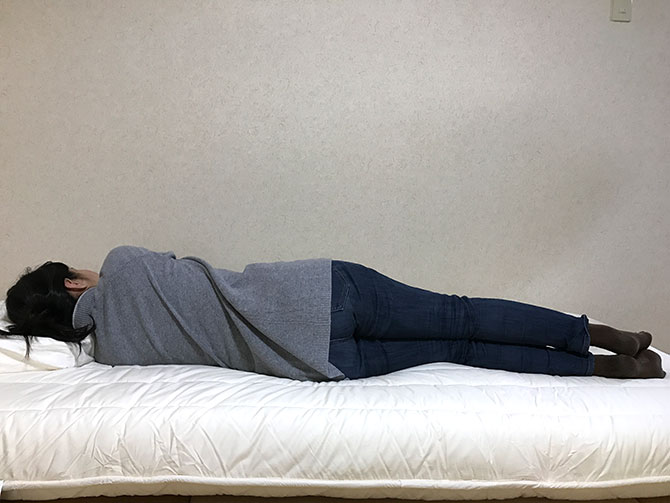
通常の布団だと眠っているあいだに腰や首などに負担がかかって寝返りをうったときに痛みが生じたり、 関節を痛める原因になることがあります。
雲のやすらぎプレミアムは独自の体圧分散を行う新クロスクラウド製法で作られていて、 中心部分に高反発スプリングマットを使って厚みのあるアルファマットで 縦方向に凹凸を作って支えるので体を押し返すようにサポートし、 寝ている間に体の各部分にかかる負担を最小限に抑える効果があります。
寝返りのときも雲のやすらぎプレミアムが体をしっかり包み込んでくれるので 筋肉や関節に重みがかかることがなく、体にフィットするのでまるで雲の中に浮かんでいるような寝心地で、 従来の布団のような硬さがなくぐっすりと眠れます。
雲のやすらぎプレミアムのマットレスの魅力と特徴
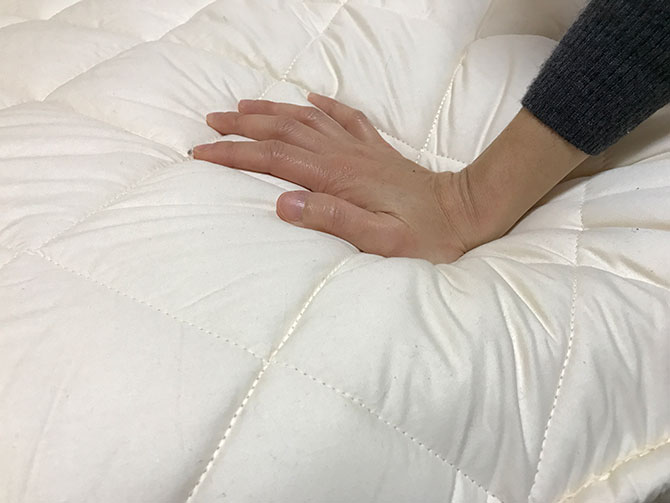
雲のやすらぎから雲のやすらぎプレミアムへバージョンアップしたポイントは2つですが、雲のやすらぎプレミアムには、その他にも7つの特徴があります♪
腰痛改善のためだけじゃなく、質のいい睡眠をとりたい方は必見です♪
雲のやすらぎプレミアムは楽天の敷き布団ランキングで連続1位を獲得実績がある!
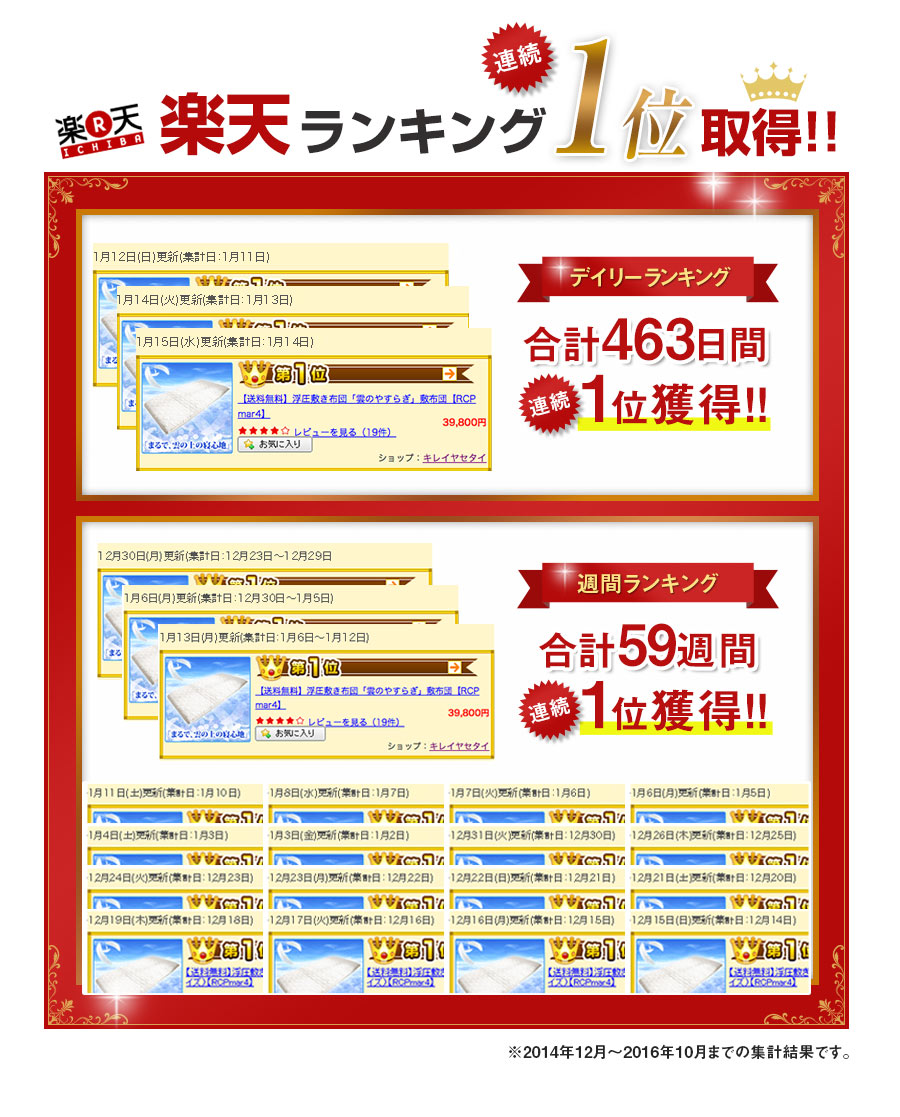
雲のやすらぎプレミアムの敷き布団は、楽天市場でも販売されています。
その楽天市場の“敷き布団ランキング”で、
●ウィークリーランキング 59週間
を獲得した実績もあるんです。
楽天市場でこんなに売れているということで、どれだけお客様からの満足度が高いのかがわかりますね。
雲のやすらぎプレミアムはマットレスが17cmの厚みでへたりしらず

雲のやすらぎプレミアムが今までの寝具と違うところはなんと言っても17cmという極厚のボリュームです。
凹凸アルファマットで高反発スプリングマットを挟んだサンドイッチ構造になっているので理想の寝姿勢を保ったままで朝までぐっすり眠れて、腰痛や関節痛などを防ぐためにも役立ちます。
雲のやすらぎプレミアムはマットレスで寝返りをしっかりサポート
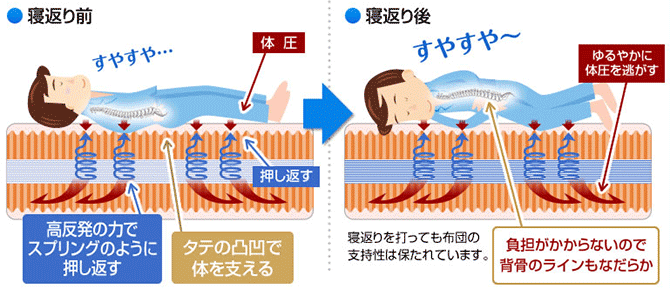
雲のやすらぎプレミアムの中央部分に使われている高反発スプリングマットは体の動きに対してしなやかに反応してくれる優れた素材で作られていて、理想的な寝姿勢を保つ効果があります。
高反発ウレタンフォームを100%使用しているので寝たときに体を持ち上げてくれるような効果で、心地いい寝心地を実現できます。
寝返りをうつときにもウレタンの力で体圧分散が行われ、最小限の力だけで体を動かせるので余計な負担がかからず、ぐっすり深い眠りを維持することが可能です。
雲のやすらぎプレミアムなら布団が体全体を包み込んで守ってくれるような寝心地が体験できて、ベッドでも床でも今までとは違うふわふわの感触で体に優しい睡眠をサポートできます。
雲のやすらぎプレミアムは凸凹マットレスで体を点で支える体圧分散
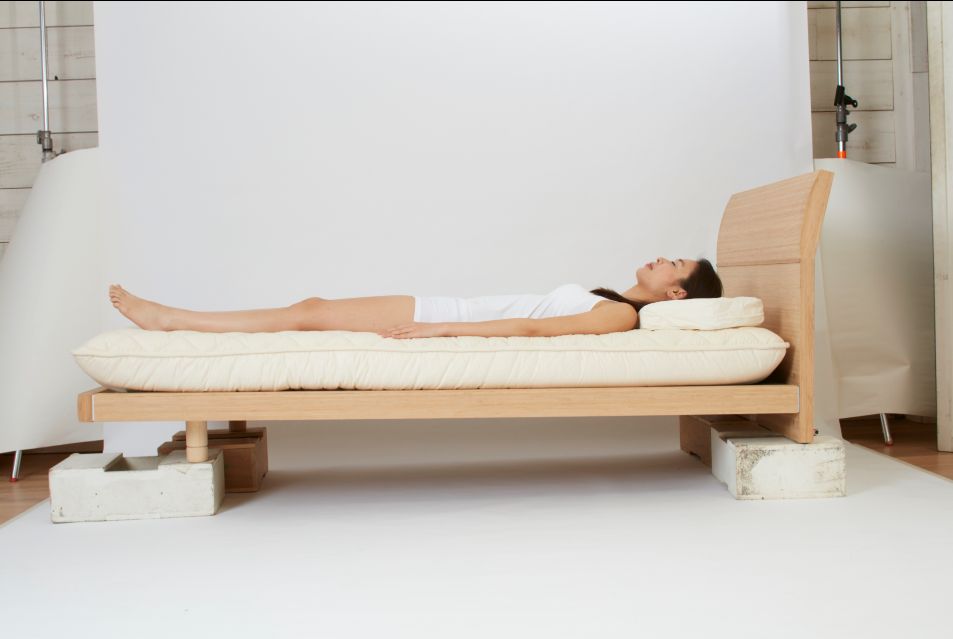

雲のやすらぎプレミアムは、通気性に優れているアルファマットが使われています。
汗をしっかりと乾かしてくれるだけでなく、垂直の凸凹があなたの身体にかかる体圧拡散を実現してくれます。
クッション性がちょうどいいことはもちろんのこと、耐久性にも効果をもたらしてくれています。
これまでにどんな治療をしても腰痛が改善されていない人は、雲のやすらぎプレミアムを使ってみてください。
これまでの寝具が原因で腰痛になっていた人は、これまでの寝具とは異なる寝心地を感じられます。
腰痛対策には「体圧分散」と「腰を冷やさないこと」の2点。
この2点を備えもつ寝具は【雲のやすらぎプレミアム】だけ!!
雲のやすらぎプレミアムを使うと、一晩中きもちよく寝られるため疲労回復にも高い効果を期待することができますよ。
雲のやすらぎプレミアムは羊毛フリース素材で寒い季節もポカポカ

雲のやすらぎプレミアムに使われているのはフランスのロレーヌ地方で飼育されている高品質な羊毛です。 特にフリースと呼ばれる背中の毛を採用しているので、弾力性や保温性に優れていて汚れも少なくほかの羊毛原料よりも高級で極上の寝心地を実現できます。
従来のウールマークの基準よりもさらに厳しい検査をクリアしたファイングレードウールなので、特に冬の寒さに強くて一晩中暖かさをキープして安眠をサポートしてくれます。
外からの刺激にも強くて耐久性のよい素材なので洗濯をしてもボリュームが減らず、末長く布団の弾力や厚さが保たれます。 雲のやすらぎプレミアムならふわふわの寝心地で、冷え性の人や硬い布団が苦手な人も朝までぐっすり眠れます。
雲のやすらぎプレミアムは暑い季節はサラッとさわやか♪
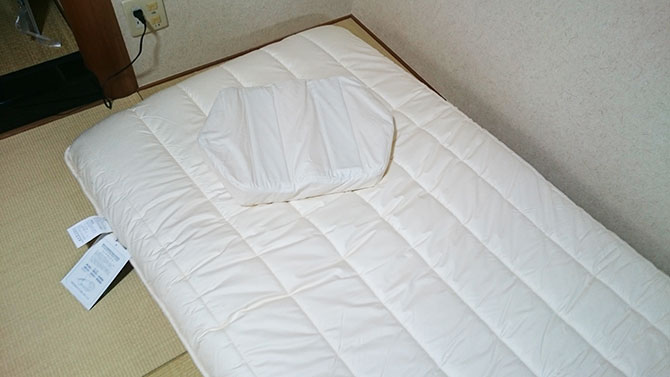
雲のやすらぎプレミアムに採用されているマイティトップⅡとは、帝人ファイバー株式会社が独自に開発した防ダニ・防菌・防臭のある中綿です。
安全性基準のテストにも合格していて、熱をこもらせない特徴があるので特に夏場の暑い季節に威力を発揮してくれます。
寝ている間に汗をかいたり、梅雨で湿気が多いときでも特殊なポリエステルのおかげで快眠できて、お手入れも簡単です。
雲のやすらぎプレミアムならダニやハウスダストでアレルギーがある人でも防ダニ・防菌効果があるので安心して眠れます。
いやな臭いが発生するのも防いでくれるので末長く使えて、ふわふわの雲の上で寝ているような幸せな気分を実感できます。
子供から高齢者まで幅広い層におすすめの布団です。
雲のやすらぎプレミアムはリバーシブルマットレス!一年中使えます
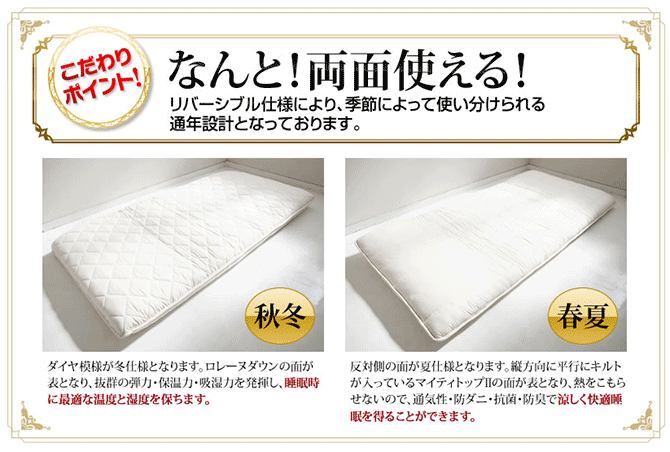
雲のやすらぎプレミアムは両面を使えるリバーシブル設計になっているので季節を問わず一年中使えるメリットがあります。
春から夏にかけてはマイティトップⅡの面を使うと通気性がいいので湿気がこもらず快適で、ダニやカビを防止することができます。 秋から冬の寒い季節にはフランス製の上質なロレーヌダウンを使っている面を表にして寝ると保温力があるので一晩中暖かくてぐっすりと眠れます。
中央には高反発なスプリングを凹凸アルファマットで挟んだ構造になっていて、ボリュームがあり体が雲の中で浮いているような気持ちになれます。
布団が薄いと感じたり腰が痛くて眠れないときも、雲のやすらぎプレミアムなら包み込むような極上の寝心地です。
雲のやすらぎプレミアムは安心・信頼の日本製マットレス

雲の上にいるような寝心地を追求した5層構造厚さ17cmの敷布団、雲のやすらぎプレミアムは、日本国内の工場で製造しています。
日本製だからこそ、細部まで行き届いた徹底した品質管理が実現し、高品質な製品を作り出しています。
雲のやすらぎプレミアムは、まず厳選した原料選定から行われ、凹凸ウレタンと高反発ウレタンは日本製です。
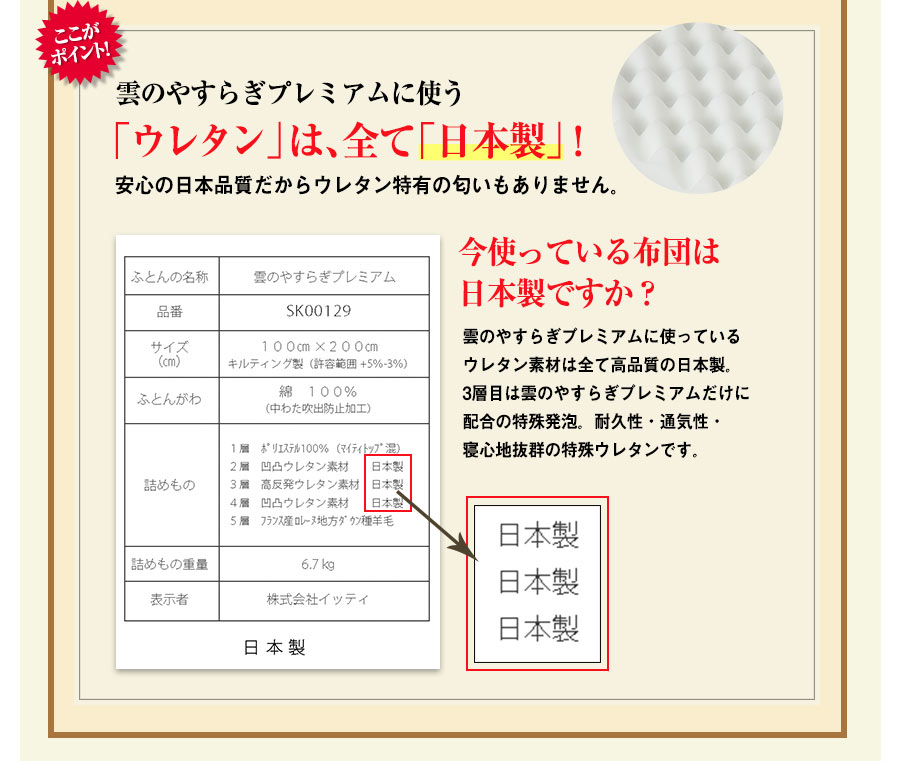
フランス産の羊毛は日本の布団工場で一つ一つ編まれ、出来立てフカフカの物を布団に使っています。
また、縫製は厚さ17cmということもあり、特殊なミシンを使って一枚一枚縫製していっています。
まさに職人技ですよね。
検品や検針、梱包まで工場で行われているので安心です。
雲のやすらぎプレミアムマットレスと一緒に六角脳枕を使えば首・肩こりも解消
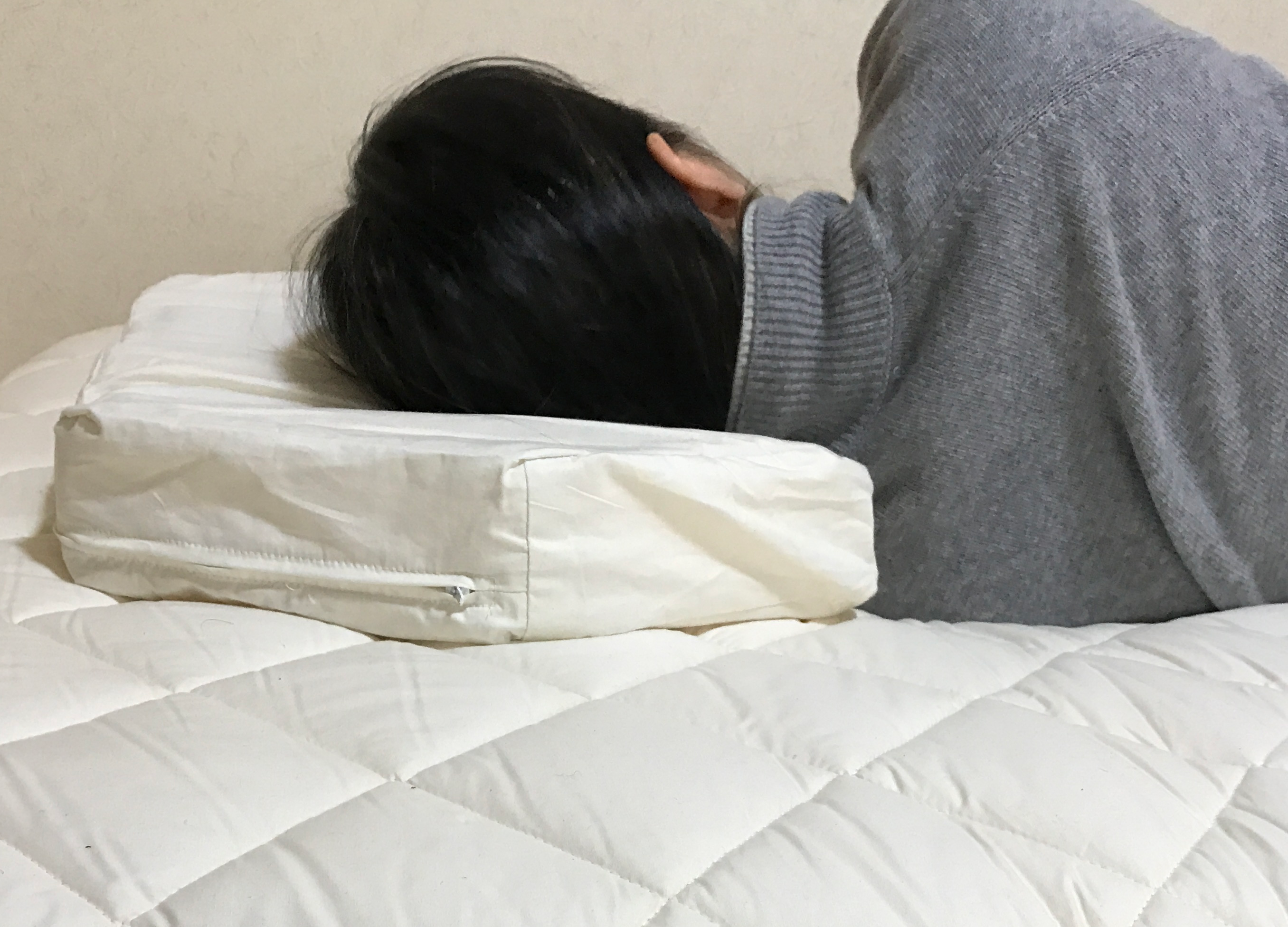
雲のやすらぎプレミアムと同じ会社、株式会社イッティが販売している【六角脳枕】もおすすめです!
雲のやすらぎプレミアムと一緒に買うと割引になるサービスもあります♪
肩・首こりが治る?!六角脳枕の特徴
肩や首のこりで悩まされ、なんだか頭が重い~なんていう方にはぜひおすすめしたい「六角脳枕」。
私は腰痛はないのですが、肩こりや首こりは人並み以上にあるので、雲のやすらぎプレミアムを購入する時にセット購入しました。
セット購入で、28,300円もお得に買えたのもうれしかったですね♪
実際に劇的に、突然肩や首こりがなくなるかというとそうではないのですが、寝つきが良くなり頭が軽くなったような気はします。
そこで、そんな不思議な六角脳枕の特徴にせまりましょう。
表面の凸凹構造
六角脳枕は凸凹があることにより、とにかく寝返りを打ちやすいです!
今までは平らな枕に寝ていたのですが、うまく寝返りを打てていなかったんだな、と実感するほどです。
首のところが凸になっている枕は見かけたことがありましたが、
横にナミナミしているのは変わった形だなと思いましたが、これが安眠の秘密でした♪
W保冷材でひんやり
昔から【頭寒足熱】という言葉があるように、頭を冷やして足を温めると良質な睡眠がとれ
健康にもよいとされています。
それを再現したのが、まさに【雲のやすらぎプレミアム+六角脳枕】です!
六角脳枕にはなんと保冷剤が2つも入っていて冷たすぎないひんやり感が感じられるのです。
後頭部がひんやりすると入眠しやすかったので、この発想には感動しました。
素材にこだわり!
世にでている枕にはそば殻や羽根、ストロー枕やビーズ枕など色んな中身がありますよね。
その中でも六角脳枕は【低反発マイクロウェーブ素材】を使っているようです。
マットレスは高反発で枕は低反発。この異素材感が体にぴったりするようです♪
そもそもなぜ肩・首こりが起こるのか?
頭の重さってご存知ですか?
実は頭って体重の10分の1ほどの重さがあるんですよ。
つまり、体重が60kgの人だと約6kg、ボーリングの球でいうと13ポンドになります。
普段私がボーリングに行って投げる球は8か9ポンドの球なので、それよりも重いものが体の上についているのです。
これにはかなりびっくりしました。
そんな重いものが一番上についているため、姿勢を正さないと歪んでしまい肩こりや首こりの原因となってしまうようです。
合わない枕が肩こり・首こりの原因
朝スッキリ起きれない、肩こり・首こりが起こる、となると原因はもしかして枕かも??
自分に合う枕を使っていれば、実は眠りの質が大幅にあがるのです。
特に多いのが、高すぎる枕です。
高い枕で眠っていると首の後ろが引き伸ばされている状態が何時間も続くので肩こりや首こりの原因となってしまうわけです。
首こりの原因、ストレートネックってなに?
先ほど述べたように、頭はとても重いです。
にもかかわらず、現代の人はスマートフォンやパソコンを見ている時間が長く、ついついうつむくような姿勢をとってしまいがちです。
こうした姿勢の悪さが続くと首のカーブがなくなり、ストレートネックになっていってしまいます。
そして、症状が悪化すると頭痛や肩こり、首の痛み、手のしびれ、ひどくなると逆流性食道炎やうつまでを引き起こしてしまいます。
骨盤や股関節の歪みがストレートネックに
首と骨盤、股関節…一見関係がなさそうに見えますよね。
だけど、骨盤や股関節が歪んでいる人の場合、全身がバランスを保とうと腰が反り、更にそれを補うために背中が猫背になりやすくなります。
その結果、首のカーブが失われてしまいストレートネックになってしまうことがあります。
そんな骨盤のゆがみや股関節の歪みが原因のストレートネックや首こりには雲のやすらぎプレミアムと六角脳枕のセットは最強コンビだと思いますよ。
肩こり解消のおすすめ枕ランキングをご覧になりたい方は>>コチラ
雲のやすらぎプレミアムの販売元とメーカー
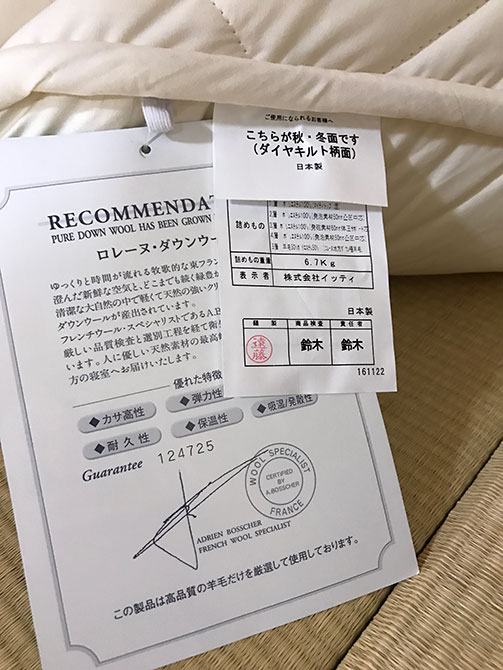
「雲のやすらぎ」の販売元は「株式会社イッティ」で、イッティの事業の1つがECサイト運営です。
このサイト「一番星」が「雲のやすらぎ」などの商品を企画提供しているメーカーでもあり、 メーカーとお客様を直接結びつけることで、コストの削減をしています。
「ありそうでなかった」商品にこだわって企画からすべて自社開発し、購入者の感想なども活かしています。 「雲のやすらぎ」以外に販売しているのは、サプリメントなどです。
「イッティ」ではこのほか、他社が開発製造してサイトで販売している良いけれど売れていないサイトを 引き受けて運営する「成果報酬型まるごとお任せサービス」や、 商品と有名人を結んで広告展開などを行い、認知度を上げて利益につなげる 「タレントタイアップ事業」を行っています。
雲のやすらぎプレミアムのマットレスを通販で買うならここ!

結論から言えば、「雲のやすらぎプレミアム」の価格は、公式サイトの「一番星」と「楽天」、 「ヤフーショッピング」のレビューを見ても全く同じなので、この3つのサイトのすべてが最安値となります。
幅120cmのセミダブルが49,800円
幅140cmのダブルが59,800円
です。
ちなみに、「Amazon」では過去には販売実績があるようですが、現在は取り扱いはありません。
購入には公式サイトがおすすめです。公式サイトと楽天では、安眠枕「六角脳枕」や、 敏感肌の人にも安心な掛け布団「陽だまりの休息」とのセット販売もしていますが、 これも値段に違いはありません。
送料も無料で変わりません。
雲のやすらぎプレミアムQ&A

雲のやすらぎについてよくある疑問をまとめました。
Q.雲のやすらぎプレミアムを再安値価格で購入する方法は?
今、雲のやすらぎプレミアムが購入できるのは、公式サイト・楽天市場・yahoo!ショッピングの3店舗です。
実は、この3店舗内での購入なら今現在はどこで購入しても価格は同じです。
でもベストは公式サイトで正規品を購入すると、万が一不良等のトラブルにも対応してくれるサービスがあります。
安くない買い物だからこそ、万が一のアフターサービスはしっかりしていたほうが安心ですよね。
だから、私は公式サイトからの購入をおすすめします★
Q.雲のやすらぎプレミアムの再安値サイトがたくさんあるけど嘘??
インターネットで、「雲のやすらぎ 再安値」と検索すると【再安値で購入するならココ】というサイトがたくさん出てきます。
雲のやすらぎプレミアムは、少しお高めなので少しでも安く購入できるなら、安く買いたいという人がほとんどだと思います。
そんな時に再安値のサイトを見ると、ついそこで買ってしまいそうになりますが、ちょっと待った!
大体のサイトで、すでに値下げされた金額がかかれている可能性が大です。
私が調べる限りでは、再安値は今のところ、公式サイトで購入する、【39,800円(税込)送料無料】です。
また、公式サイトからのネット購入なら返品・返金の対応もしてくれるので、安心ですよ。
再安値を謳っている全てのサイトが嘘を言っているわけではないですが、正規品を安く、安心して購入するには公式サイトでの購入をおすすめします。
Q.雲のやすらぎプレミアムにキャンペーンってあるの?
雲のやすらぎプレミアムは、今なら通常価格59,800円から2万円オフキャンペーン実施中で39,800円!!!
しかも送料も無料。
大きい買い物をした時は、送料がかかってしまうこともあるので、これはうれしいですね♪
また、今は期間限定で100日間の返金保証キャンペーンも実施中です。
雲のやすらぎプレミアムは実際の店舗で試すことができないので、使用後も返品できるこのキャンペーンを利用すれば気軽にお試しができます。
100日間返金保証キャンペーンの詳細はこちらで確認できます。↓
Q.雲のやすらぎプレミアムのサイズ展開は?
雲のやすらぎプレミアムのサイズ展開は、
・セミダブル
・ダブル
の3サイズです。
それぞれの寸法は、
| 幅 | 長さ | 厚み | |
|---|---|---|---|
| シングルサイズ | 100cm | 200cm | 17cm |
| セミダブルサイズ | 120cm | 200cm | 17cm |
| ダブルサイズ | 140cm | 200cm | 17cm |
ですので、ベッドの上にのせて使う場合など、は対応サイズを確認して購入して下さいね。
Q.雲のやすらぎプレミアムはベッドでもフローリングでも使用できる?
雲のやすらぎプレミアムは17センチのボリュームが特徴なので、 ベッドでもフローリングや畳などの床でも底付き感がなく直接使用できます。
マットレスも不要なのでそのまま置くことができて、 陰干しをして湿気を取るだけでお手入れができるので保管も簡単です。
Q.雲のやすらぎプレミアムは腰痛に効果があるって本当?
雲のやすらぎプレミアムは、もともと腰痛軽減敷き布団として有名になりました。
実際に、ひどい腰痛に悩んでいた私の友人Tさんも雲のやすらぎプレミアムを勧めたところ、だいぶ腰痛が軽減されたのこと。
他にも口コミを見てみると腰痛が軽減された人がたくさんいるようですので、個人差はあるかと思いますが腰痛にも効果があると思います。
Q.モットンと雲のやすらぎプレミアムってどちらがマットレスとして腰痛改善効果があるの?
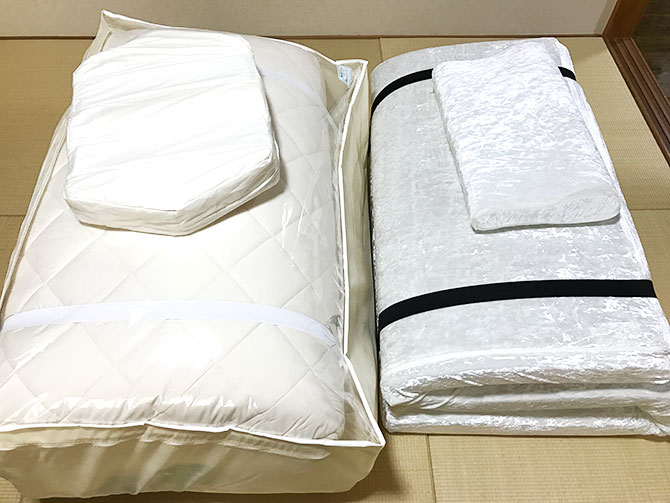
モットンと雲のやすらぎプレミアムはどちらも体に優しいマットレスとして有名で、 特に腰痛で悩んでいる人に効果が高いと言われています。
どちらの商品も高反発スプリングマットを使用していて体圧分散ができるので 寝返りのときの負担が少なかったり体全体にフィット感があってぐっすり眠ることができますが、 雲のやすらぎプレミアムはバージョンアップしてからサイドスプレッドマットやアルファマットなど 独自開発の技術を使ってより一層反発力を強めてあるので本当に雲の中で寝ているような効果が得られます。
モットンも厚みがあって腰痛対策のために効果的なマットレスですが、 中国製であることや寝心地を実感できるまでに時間がかかるなどのデメリットがあるので 雲のやすらぎプレミアムを選ぶ人が増えています。
Q.雲のやすらぎプレミアムは店舗でお試しできる?
雲のやすらぎプレミアムは通販専門の商品なので残念ながら店舗で実際の商品を 試すことはできないのが現状です。
使い心地を知りたいなら雲のやすらぎプレミアムを実際に使用している人の 口コミや体験談がたくさんあるので参考にしたり、 サイトで紹介されている写真や動画を見ると大まかな感じを把握できて、 部屋に置いたときの感じや横になったときに体がどのくらい沈むのか、 手触りや反発力などもわかります。
通販限定で販売することで上質な商品を低価格で提供できるシステムなので、理解した上で購入しましょう。
Q.雲のやすらぎプレミアムに返品制度はあるの?
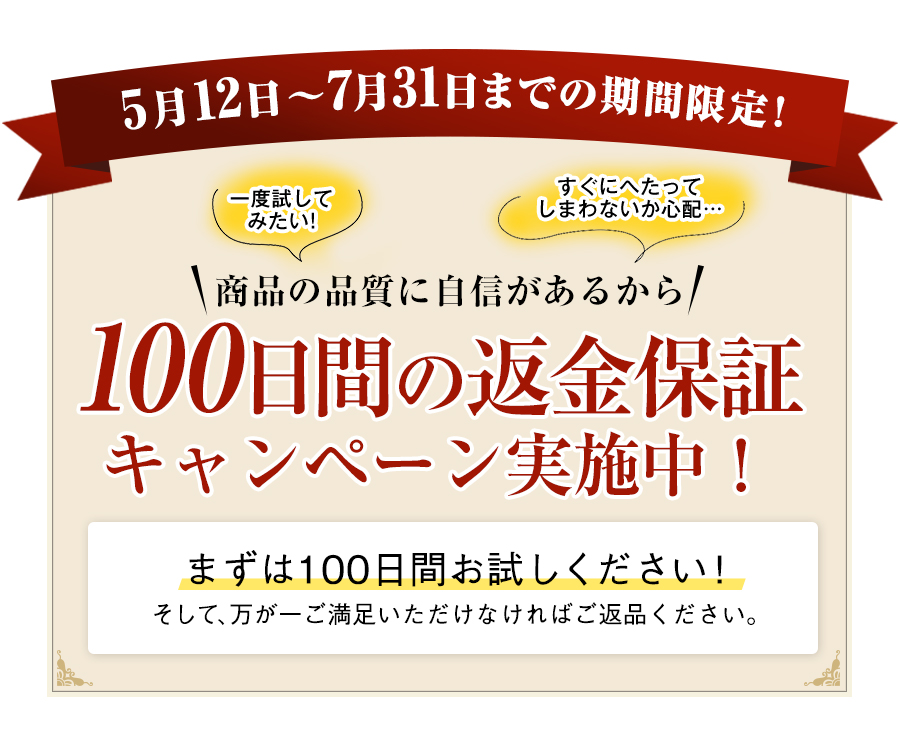
今まで雲のやすらぎプレミアムには返品制度はなかったので、高い買い物に躊躇してしまう方もたくさんいらっしゃったと思います。
それが、この度期間限定ですが返金保証キャンペーンが実施されることとなりました!
5月12日~7月31日の間に購入いただいた方には100日間返金保証が付いてきます!
100日間お試しで使ったあと、満足できる効果が得られない時は返品することができます♪
たっぷりとお試しできるから、すぐにへたってしまわないかなどをじっくりお試しできます。
すごくお得なキャンペーンだと思うので、ぜひ雲のやすらぎを試してみたかった方や敷布団やマットレスに不満がある方に利用していただきたいです♪
Q.体重が軽いけど、雲のやすらぎプレミアムは使わないほうがいい?
結論から言いますと、高反発の敷き布団は、ある程度体重が重い人におすすめの敷き布団だということです。
体重が軽い人が高反発の敷き布団やマットレスを使うと、体との間に隙間ができてしまいます。
これではせっかくの体圧分散の力が発揮されません。
体重が軽い人には、どちらかというと低反発マットレスをおすすめします。
Q.雲のやすらぎプレミアムは、子供でも使えるの?
子供は、それ専用の布団が売られているので、子供用の布団を使わないといけないのかと思いがちですよね。
赤ちゃんだとベビー用布団を使用したほうがいいですが、ある程度成長した子供なら、大人と同じ布団を使っても大丈夫です。
あまりにフカフカの柔らかい布団だと、体が沈みすぎて関節などの骨が歪んでしまう原因になります。
なので、適度な硬さのある敷布団やマットレスを使う必要があるといえます。
雲のやすらぎプレミアムは、沈み込みすぎない高反発素材なので、寝返りも打ちやすく子供でも十分に使ってもらえます。
ダブルサイズを使えば、添い寝もできるのでおすすめです。
Q.雲のやすらぎプレミアムに専用シーツってあるの?

雲の上で寝ているような夢心地で安眠できる極厚の布団「雲のやすらぎプレミアム」は 普通のシーツを使ってもじゅうぶん快適に使えますが、 専用の3重ガーゼBOXシーツも存在するので合わせて使うとより一層心地よく眠ることができます。
本体と同様にシングル、セミダブル、ダブル用の大きさが用意されていて、 優しい肌触りで着色料や漂白剤を使わない無添加の素材で作られています。
日本製なので敏感肌の人や赤ちゃん、お年寄りまで誰でも使えて通気性もいいので湿気がこもりません。 洗濯やお手入れも簡単で、いつでも清潔な状態が保てます。
専用シーツは雲のやすらぎプレミアムの本体購入時に一緒に注文するのが便利で、 サイズを間違える心配もありません。
Q.雲のやすらぎでカビが生えたという口コミがあったんだけど大丈夫?

雲のやすらぎプレミアムでカビが生えてしまう原因は、 通気性のよい素材を使っているため逃げた水分がフローリングや畳の間に溜まって 結露してしまうことだと考えられます。
フローリングや畳で使用する場合はカビを防ぐためには敷パッドやスノコなどを置いて じゅうぶんに湿気対策をすれば問題ありません。
換気のできない環境や汗をかきやすい体質など条件によってはなるべく風通しをよくして 使っていない時間は布団を天日で干したり、裏返しにして空気に当てるなどの対策を行うのがおすすめです。
雲のやすらぎプレミアムはしっかりお手入れをすれば長期間使える便利な布団なので、 床に敷くときは必ず敷パッドやスノコを使って水分を逃がしてあげるようにしましょう。
Q.雲のやすらぎプレミアムは重いって本当?
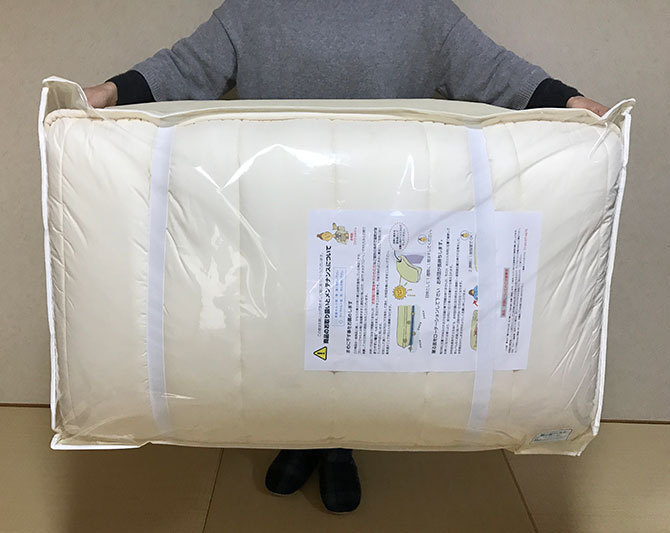
雲のやすらぎプレミアムにはシングル、セミダブル、ダブルの3つのサイズがあり、 どれでも重さは普通の敷布団よりも軽いくらいなので女性でも楽々収納したり持ち上げて お手入れをすることが可能です。
使われている素材がウレタンやポリエステルなど軽くて通気性のよいものなので、 見た目の厚さからは想像できないくらいコンパクトな軽さが魅力です。
従来の敷布団は綿でできていて湿気を吸収してじめじめした感じになったり重いので扱いが困難でしたが、 雲のやすらぎプレミアムなら驚くほど軽いのでこまめに位置を変えたりベランダなどに出して お手入れをすることができます。
Q.雲のやすらぎプレミアムは折り曲げれないって本当?収納の仕方は?
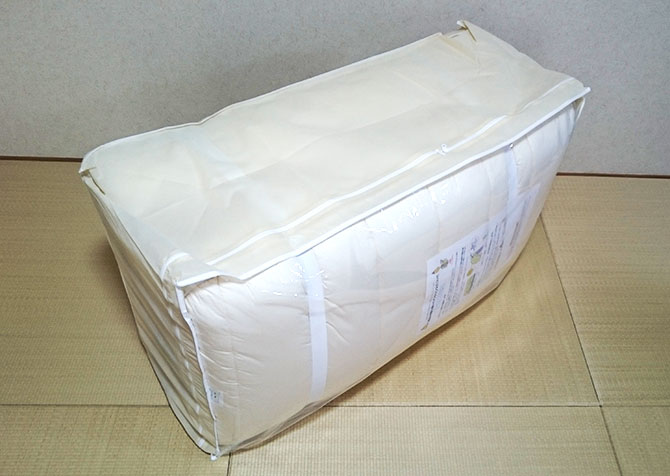
雲のやすらぎプレミアムは折り畳んだ状態で配送され、 収納に便利なゴムバンドと透明のカバーケースも付いてくるのでこれを利用して コンパクトにまとめることができます。
2つ折りにすれば押し入れに簡単に収納できるサイズになるので 場所を取らず、寝室が広いならそのまま壁などに立てかけることも可能です。
厚みがしっかりあるのでまるで雲の中に寝ているような寝心地で、防ダニ、防カビに 有効な素材を使っているので梅雨や夏場のじめじめしたシーズンでも安心です。
Q.雲のやすらぎプレミアムはへたりやすいって本当?
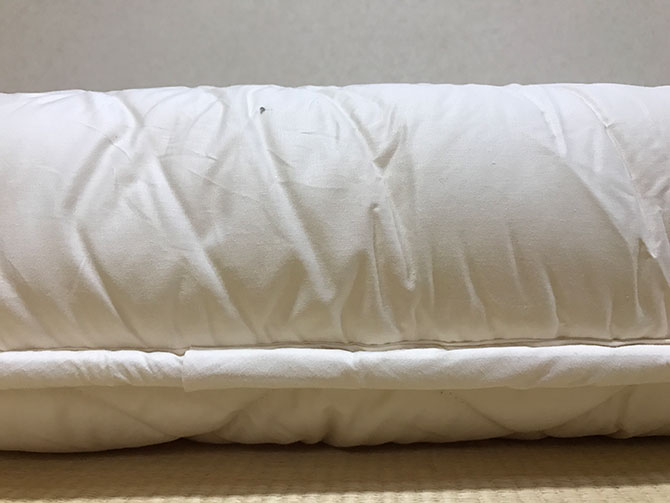
雲のやすらぎプレミアムは5層構造になっている布団で、 中央には高反発のウレタンフォームを100%使用した高反発スプリングマットが採用されていて、 体圧分散をして体をしっかり支える役割を果たします。
更に凹凸アルファマットをサンドイッチ状に配置している高反発マットレスが布団全体を分厚くガードして、 表面層には特種素材のポリエステルや羊毛を使っているので全体の形がしっかりと整えられて へたりが無くなるような構造に仕上げてあります。
使ったあとで湿気を取るために風を通したり、 天日干しや陰干しをするなどお手入れをしっかり行えばへたることがなく長期的に使用できるので、 雲のやすらぎプレミアムで毎日極上の眠りを楽しめます。
Q.雲のやすらぎプレミアムのマットレスのお手入れ方法って?
マットレスを風通しのよいところで陰干しすることと 2週間に1回ぐらいでいいので、雲のやすらぎプレミアムのマットレスの上下の位置を反対に交換するのがポイントです!
通気性が良いのでフローリングなどの床に敷きっぱなしにするとカビ等が生える可能性があります。 敷きっぱなしにする方は、すのこの上などに敷くと毎日畳まなくてもいいので楽ですよ♪
Q.雲のやすらぎプレミアムのマットレスの耐久性は?
1か月~半年ほどでへたったという報告もありますが、前述のお手入れをしていれば数年は使えます。
3年も使えば使用感は出ますが、雲のやすらぎプレミアムにバージョンアップしてから高反発スプリングマットを採用したのでへたりは少ないかと思います。
Q.雲のやすらぎプレミアムは夏に使うと暑い?
高反発敷き布団、雲のやすらぎプレミアムは秋冬面と春夏面のリバーシブル構造となっています。
秋冬の面は、フランス産羊毛のロレーヌダウンが使われていて、冬用の敷きパッドをしかなくてもとても暖かいです。
では、春夏用の面はどうでしょうか??
防ダニ使用のマイティトップⅡという中綿を素材に使っています。
マイティトップⅡは、防ダニ防菌防臭の素材で、熱をこもらせない素材だそうです。
なので、夏でも通気性がいいので、爽やかに眠ることができます。
その代わり、汗などが上から下に流れやすいので、まめに干したり乾燥させたりしないとカビの原因になったりします。
そんなトラブルを避けるためにも、マメに干したり除湿パッドを下に敷いたりすのこを敷いたりして常に乾燥させることを意識させることがポイントです。
Q.雲のやすらぎプレミアムの評判は?
まず、楽天市場の敷き布団ランキングで、連続1位を獲得しているということが結果だと思います。
【まるで雲の上で寝ているみたい】というキャッチフレーズと【雲のやすらぎ】という名前のとおり、ふかふかとした寝心地が評判となっているようです。
4万円程度にもなるので安い買い物ではありませんが、今、100日間返金保証キャンペーンも実施中なのでぜひお試ししてみてはいかがですか?
雲のやすらぎプレミアム レビュー&口コミ
職場の同僚のTさん(重度の腰痛もち)にも雲のやすらぎプレミアムをすすめた結果、雲のやすらぎプレミアムで眠った日の翌日からぐっすり眠れるようになり、しかもひどかった腰痛がすっかりよくなったそうです!
ぐっすり眠れているようなので、なんだか肌ツヤや顔色もよくなり、口癖だった「腰痛い~」と腰をトントンする仕草がなくなったせいか今までよりも若返ったような気がします★
私は幸いにも元々腰痛があまりなく、雲のやすらぎプレミアムが腰痛に効果があるかはレビューできないのでTさんに腰痛への効果を書いてもらいました♪
Tさんの雲のやすらぎプレミアム レビュー
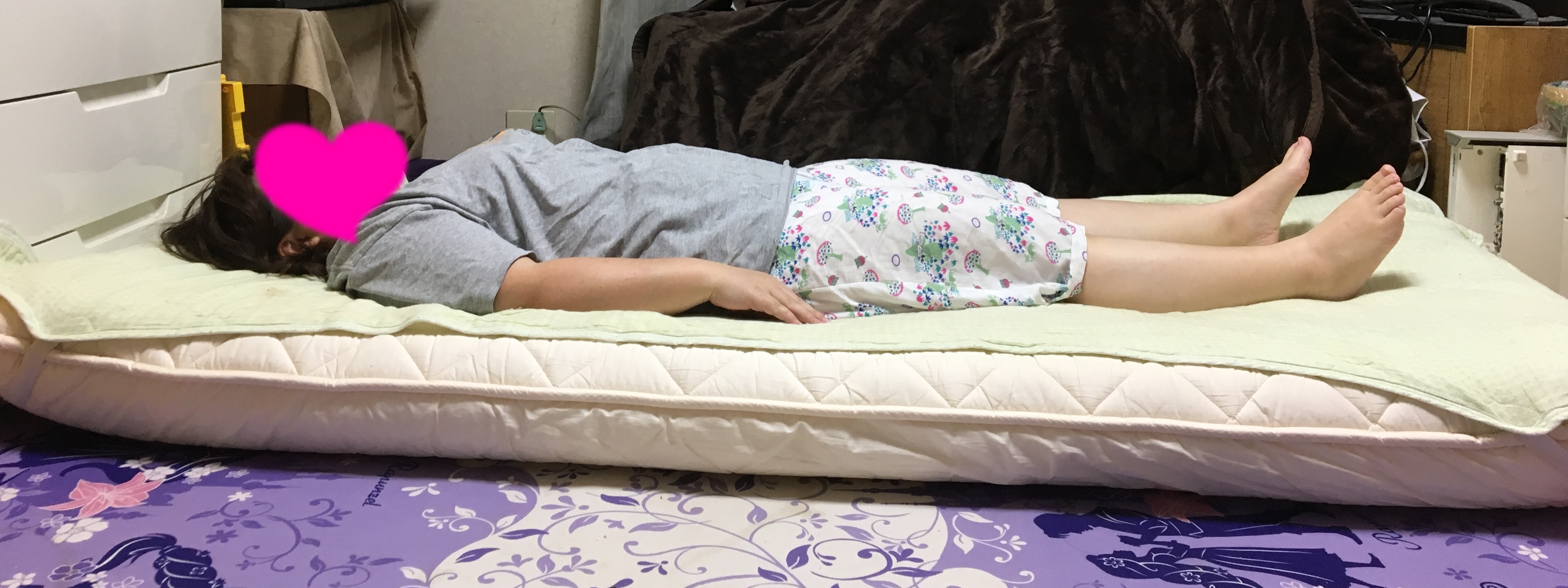
あまりにも酷いときには整形外科で電気をあてることもありましたが、 仕事をしている上にお腹を空かせた子供が家で待っているのでなかなか病院通いをすることが出来ませんでした。
デスクワークの仕事をしているので1日中椅子に座っていることが多く 辛くて時に立ったまま仕事をしたり、
腰を伸ばす運動をしたりして痛みを紛らわせていたら
同僚が「今私が使っている雲のやすらぎプレミアムという敷き布団は腰痛にも効くみたいだよ」と教えてくれました。
同僚が雲のやすらぎプレミアムと出会ったのは、
敷布団派なので床からの底冷えを感じない、冷え性にも優しい敷布団はないかと色々調べて寝具を変えてみたのがきっかけだそうです。
その同僚は、『昨日もよく眠れなかった~』と午前中や昼一番なんかは、とても疲れた顔をしていたのに、
確かに「雲のやすらぎプレミアム」に変えた頃から朝からイキイキとして今までの彼女とは別人のようでした。
寝具を変えるだけでそんなに変わるのか?と少し疑っていましたが、
ネットで色々調べていたら腰痛には高反発マットレスがいい書いていたので半信半疑で
かなり高いなぁと思いながら同僚が勧めてくれた「雲のやすらぎプレミアム」を思い切って購入することにしました。
「雲のやすらぎプレミアム」が届いて、まずびっくりしたのが敷布団の分厚さでした。

隣に子供の布団を敷いているのですが1/3ぐらいの厚さで、
今までこんな 布団に寝てたのかとびっくりしました。
(今でも子供はその布団に寝ているのですが・・・)
寝転んでみて思ったのが、敷布団が体に沿って密着している・・・
柔らかくてふかふかで「雲の上で寝てるような寝心地の敷布団」は まんざら嘘ではない!
それが第一印象でした。
寝返りを打っても肩に負担もなく自由に動けることが凄い。
以前の敷布団なら寝返りを打つことも肩が痛くなったりしてその度に 目が覚める感じでした。
次の日起きた時に目覚めがすっきりしていることにびっくり!
4人の子供を育てて身についてしまったのが、少しの物音で 起きてしまうこと。
今は大きくなって私より遅くまで起きていることの方が多いのですが それでもやっぱり習慣になったのか物音がすると目が覚めてしまっていました。
それが、「雲のやすらぎプレミアム」で寝てみたら一度も起きることなく朝まで眠れました。
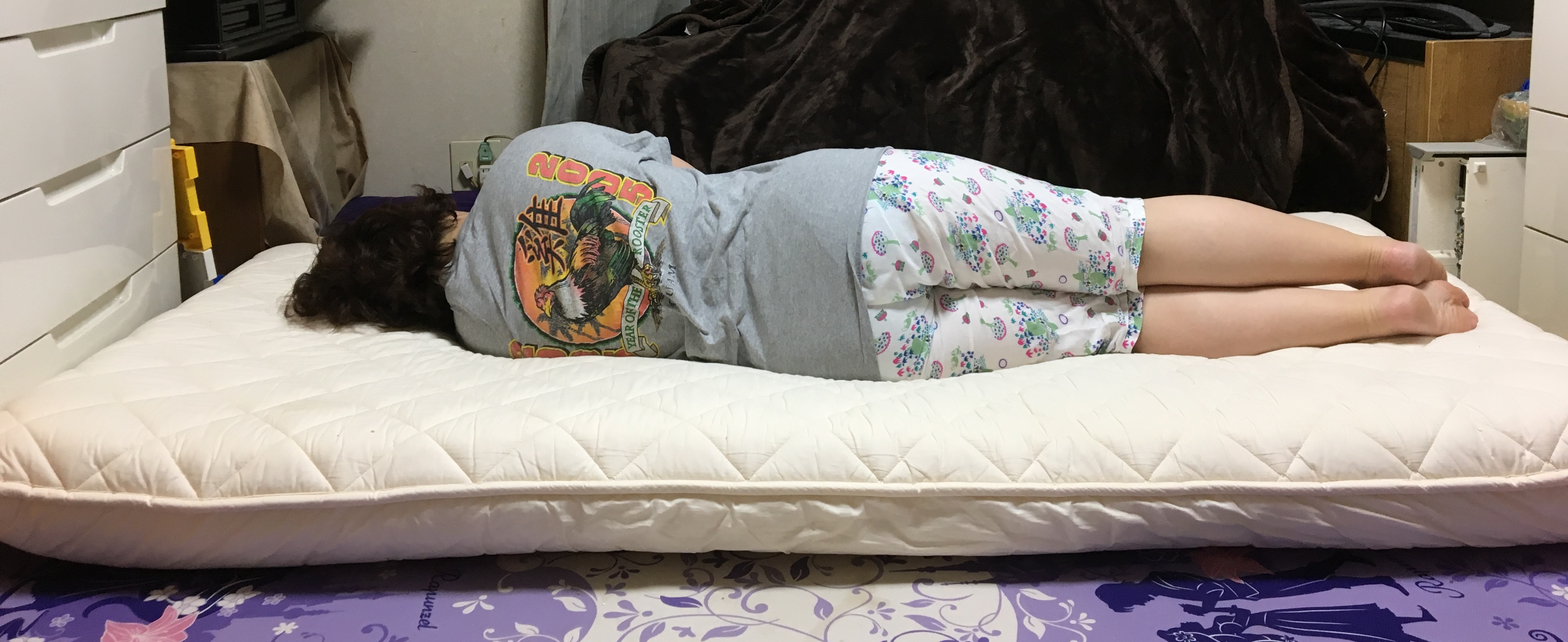
しかも、寝付きも悪くなかなか寝付けなかったのが布団に入ったらすぐに眠ってしまっていたんです。
そして、肝心の腰痛ですが、朝起きたとき全く感じませんでした。
今までなら朝起きた時も腰が重い感じで、朝ごはんを食べる頃には腰が痛くなっていました。
それが全然痛くならず、会社で椅子に座っていても痛くならなかったのです。
一度子供の友達が急に泊まりに来たので私がリビングで寝ることになったのですが朝起きて腰は痛いし目覚めもスッキリせず疲れが残っている感じでした。
普通の布団に寝るとこんなにも疲れが取れないのだと改めて思い知らされた感じでした。
もう、「雲のやすらぎプレミアム」を手放すことはできないです。
こうTさんは語ってくれました。
腰痛と冷え性、Tさんも私も悩みは違うけれど同じ「雲のやすらぎプレミアム」で悩みが解決できました!
私ももう「雲のやすらぎプレミアム」は手放せません。
雲のやすらぎの口コミ
 雲のやすらぎはその名の通りに体が宙に浮いてるのかと勘違いするような寝心地でした。口コミでもかなりいい評価を得ていますが、その口コミは伊達ではありませんでした。
確かに体を点ではなく面で受け止めてくれているという感じがしていて、ふっくらと包まれるような感じになるのがすごいと感じました。
不思議なのがこの寝ている状態で寝返りを打とうとするとこれがまたスムーズにうてるのです。
ですから、寝ていて本当に楽になるという感じがしました。(タッキー 35才 男性)
雲のやすらぎはその名の通りに体が宙に浮いてるのかと勘違いするような寝心地でした。口コミでもかなりいい評価を得ていますが、その口コミは伊達ではありませんでした。
確かに体を点ではなく面で受け止めてくれているという感じがしていて、ふっくらと包まれるような感じになるのがすごいと感じました。
不思議なのがこの寝ている状態で寝返りを打とうとするとこれがまたスムーズにうてるのです。
ですから、寝ていて本当に楽になるという感じがしました。(タッキー 35才 男性)
 雲のやすらぎは寝つきがいいもの嬉しいところです。これを使ってからかなり経ちますが、すぐに眠れるようになりました。
体が安定しているというのがいいのかもしれませんし、肌触りもよくて安心して眠れるということがいいのかもしれません。
楽な姿勢をそのままキープできるのに、寝返りなどで動きたいときには簡単に動けるということで、眠りも深い気がします。
朝にすっきりとした感じで起きられて腰痛などもこれを使い始めて気にならなくなっています。(なお 45才 女性)
雲のやすらぎは寝つきがいいもの嬉しいところです。これを使ってからかなり経ちますが、すぐに眠れるようになりました。
体が安定しているというのがいいのかもしれませんし、肌触りもよくて安心して眠れるということがいいのかもしれません。
楽な姿勢をそのままキープできるのに、寝返りなどで動きたいときには簡単に動けるということで、眠りも深い気がします。
朝にすっきりとした感じで起きられて腰痛などもこれを使い始めて気にならなくなっています。(なお 45才 女性)
 雲のやすらぎというネーミングを聞くとふわふわなイメージがしますが、少し固めのマットレスでした。
17cmの厚みがあるため、身体をしっかりと受け止めてくれる印象があり、腰痛や肩こりといった傷みの症状を改善してくれました。
今までは寝て起きても、疲れが取り切れない感じがしていましたが、雲のやすらぎを使用し始めてからは目覚めがとても良いです。
身体に負担をかけることがないため、気持ち良さが有り、寝ることが楽しみになります。(ゆかり 52才 女性)
雲のやすらぎというネーミングを聞くとふわふわなイメージがしますが、少し固めのマットレスでした。
17cmの厚みがあるため、身体をしっかりと受け止めてくれる印象があり、腰痛や肩こりといった傷みの症状を改善してくれました。
今までは寝て起きても、疲れが取り切れない感じがしていましたが、雲のやすらぎを使用し始めてからは目覚めがとても良いです。
身体に負担をかけることがないため、気持ち良さが有り、寝ることが楽しみになります。(ゆかり 52才 女性)
 雲のやすらぎを使って実際に寝ているのですが、床との底付き感がなく、いい感じになっています。
何といっても雲のやすらぎは厚みが17cmもありますから、まるで宙に浮いてるというのはちょっとオーバーですが、ベッドのような感じになってくれるのです。ベッドと違うのは柔らかさも程よい感じになっていて、固くもなく柔らかすぎることもなくということで、
しっかりと体を支えてくれながらも程よい肌触りで安定化もあるというのがいいところです。(馬場 39才 男性)
雲のやすらぎを使って実際に寝ているのですが、床との底付き感がなく、いい感じになっています。
何といっても雲のやすらぎは厚みが17cmもありますから、まるで宙に浮いてるというのはちょっとオーバーですが、ベッドのような感じになってくれるのです。ベッドと違うのは柔らかさも程よい感じになっていて、固くもなく柔らかすぎることもなくということで、
しっかりと体を支えてくれながらも程よい肌触りで安定化もあるというのがいいところです。(馬場 39才 男性)
 知り合いが雲のやすらぎを購入してよく眠れるようになったと言っていたので、試しに買ってみたのですが、とにかくこのマットレスが重いのがデメリットだと感じました。
女性1人では運べないので、押し入れにしまうこともできず、毎日敷いておくしかできないので困っています。
マットレス自体は適度の反発力があって悪くはないのですが、とても使いづらいと感じています。
やっぱり軽いほうが使い勝手がいいなと感じてしまいました。(あきこ 33才 女性)
知り合いが雲のやすらぎを購入してよく眠れるようになったと言っていたので、試しに買ってみたのですが、とにかくこのマットレスが重いのがデメリットだと感じました。
女性1人では運べないので、押し入れにしまうこともできず、毎日敷いておくしかできないので困っています。
マットレス自体は適度の反発力があって悪くはないのですが、とても使いづらいと感じています。
やっぱり軽いほうが使い勝手がいいなと感じてしまいました。(あきこ 33才 女性)
 インターネットでいいマットレスがないか探している時に雲のやすらぎを見つけて買ってみたのですが、正直とにかく硬すぎるので、ゆったりと眠ることができず、これなら今まで使っていた普通の布団のほうがいいくらいでした。
やっぱりこういうマットレスは事前に自分でその上で横になってみることが大事だと思いました。
口コミでは賛否両論ではありましたが、私には使えないと思いました。高い買い物をしてしまい、後悔しています。(歩美 48才 女性)
インターネットでいいマットレスがないか探している時に雲のやすらぎを見つけて買ってみたのですが、正直とにかく硬すぎるので、ゆったりと眠ることができず、これなら今まで使っていた普通の布団のほうがいいくらいでした。
やっぱりこういうマットレスは事前に自分でその上で横になってみることが大事だと思いました。
口コミでは賛否両論ではありましたが、私には使えないと思いました。高い買い物をしてしまい、後悔しています。(歩美 48才 女性)
 親戚が雲のやすらぎを買って、腰痛持ちでもよく寝れると言っていたので購入してみましたが、自分には慣れていないのか合わないのかはわからないのですが、とにかく寝返りが打ちづらいのでよく眠れず、睡眠不足になってしまいました。
これなら今まで使っていたもののほうがいいくらいと感じました。値段のわりにこのクオリティーならコスパは非常に悪いです。
絶対に誰にもおすすめできません。返金できるものならしたいくらいです。(西尾 61才 男性)
親戚が雲のやすらぎを買って、腰痛持ちでもよく寝れると言っていたので購入してみましたが、自分には慣れていないのか合わないのかはわからないのですが、とにかく寝返りが打ちづらいのでよく眠れず、睡眠不足になってしまいました。
これなら今まで使っていたもののほうがいいくらいと感じました。値段のわりにこのクオリティーならコスパは非常に悪いです。
絶対に誰にもおすすめできません。返金できるものならしたいくらいです。(西尾 61才 男性)
 雲のやすらぎを購入したものの自分に合わないと感じ、返品しようと問い合わせたら、返品制度はなく返品できませんでした。
このマットレスはもう使うことはないだろうし、どうしたらいいのか本当に困っています。(いずみ 29才 女性)
雲のやすらぎを購入したものの自分に合わないと感じ、返品しようと問い合わせたら、返品制度はなく返品できませんでした。
このマットレスはもう使うことはないだろうし、どうしたらいいのか本当に困っています。(いずみ 29才 女性)
雲のやすらぎプレミアムまとめ
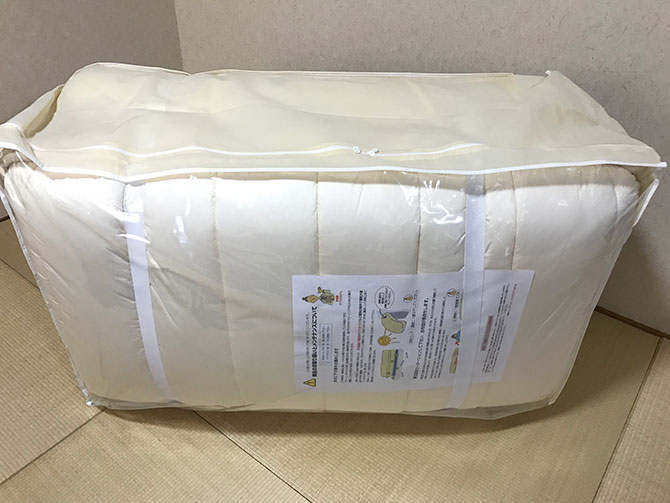
雲のやすらぎプレミアムはバージョンアップしたこちにより、さらに高反発のレベルが上がりました。
身体を支えるマットレスが進化したことにより、さらなる体圧分散が可能となって、 へたらないようになったのです。サイドスプレッドマットから高反発スプリングマットへの返還は、 寝心地の大きな影響を与えています。
ちょっとしたバージョンアップに感じますが、寝心地の違いは一目瞭然です。
朝までずっと快適に寝られることはもちろんのこと、腰痛が改善できる期待もぐっと上がったのです。
どんな寝具を使っても腰痛が治らないのであれば、 バージョンアップした雲のやすらぎプレミアムを使用してみましょう。 睡眠の質が上がったことを実感できます。